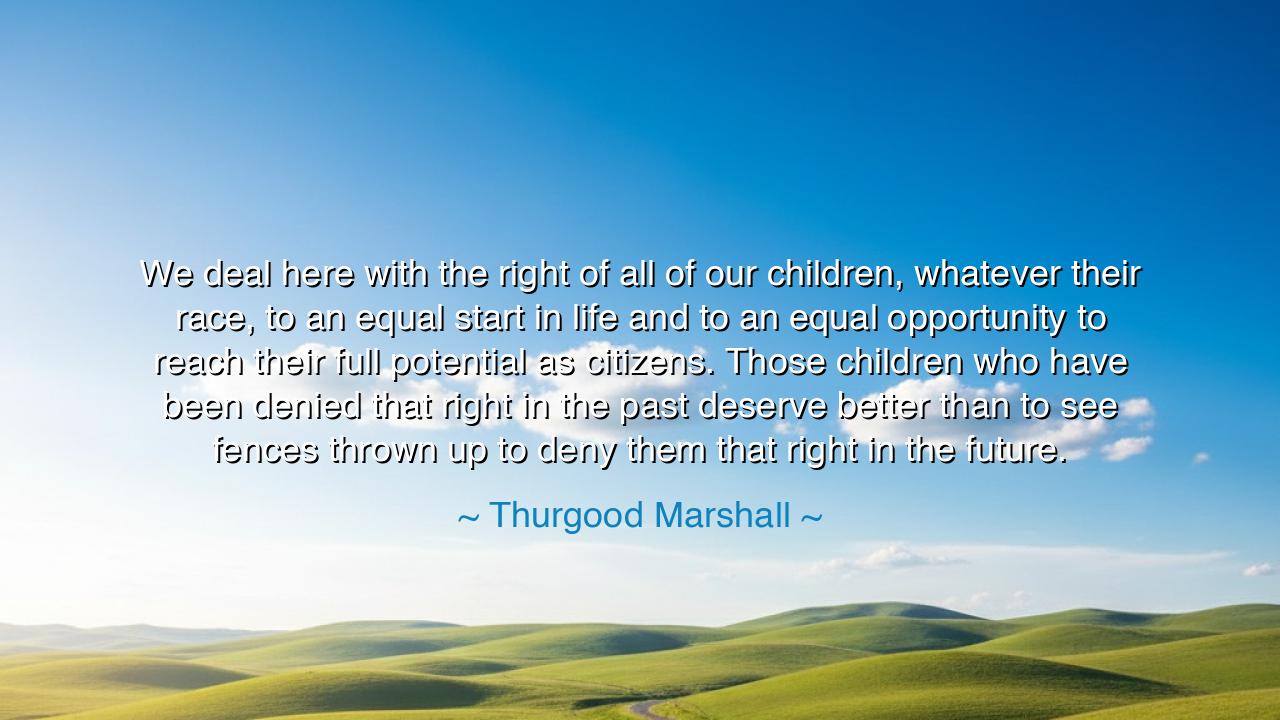
We deal here with the right of all of our children, whatever
We deal here with the right of all of our children, whatever their race, to an equal start in life and to an equal opportunity to reach their full potential as citizens. Those children who have been denied that right in the past deserve better than to see fences thrown up to deny them that right in the future.






"We deal here with the right of all of our children, whatever their race, to an equal start in life and to an equal opportunity to reach their full potential as citizens. Those children who have been denied that right in the past deserve better than to see fences thrown up to deny them that right in the future." These powerful words from Thurgood Marshall speak to the heart of justice, equality, and the fundamental rights of all people, regardless of their background or circumstances. Marshall, one of the most influential figures in the fight for civil rights, reminds us that the path to a truly just society begins with the recognition of every individual's inherent right to opportunity and dignity. He speaks not only to the children of his time but to future generations, urging us to ensure that no one is denied the chance to fully realize their potential, and that the walls of injustice should never again be allowed to rise and divide us.
In the ancient world, the notion of equal opportunity was a challenging and complex concept. The great philosophers of Greece, such as Socrates and Plato, spoke of justice and the ideal of a society where every individual could reach their fullest potential. However, in their time, only a small segment of the population—typically free men and citizens—were afforded such opportunities. Socrates believed in the importance of education and philosophical inquiry for all, but his teachings were mostly accessible to the elite. Yet, even in these ancient systems, the idea of justice—the fair treatment of people regardless of their birth or status—was central to their worldview. Marshall’s words, in this sense, echo an ancient truth: that for a society to be truly just, it must offer every individual, regardless of their race or birth, the same opportunity to reach their fullest potential.
Consider the story of Socrates, who challenged the social norms of his time by teaching a democratic ideal that encouraged individuals from all walks of life to think critically and engage in public debate. Socrates, despite his own privileged status, saw that truth and justice could not be limited to only those with power and wealth. His teachings, though not universally accepted, laid the foundation for the development of democracy in Athens, where citizens could, in theory, participate equally in decisions affecting the state. This vision of equality was imperfect in its application but pointed toward a future where all people—regardless of race, class, or gender—could engage in the political and philosophical life of society. Marshall’s statement, much like Socrates’, reminds us that true justice is not just about ensuring equal treatment but ensuring equal opportunity for all.
Similarly, the Roman Empire provided a complex view of equality. While it was a society marked by rigid class distinctions and slavery, there was a concept of universal citizenship introduced by Emperor Caracalla in the 3rd century AD. By granting citizenship to nearly all free men within the empire, Caracalla sought to bring all people under the rule of law, giving them the right to participate in society on more equal terms. This monumental act of inclusion was an early, albeit imperfect, attempt to extend opportunity beyond the traditional limits of birth and station. Marshall’s fight for civil rights in America was a continuation of this ancient struggle—where citizenship and equality were more than mere words but essential to creating a fair and just society.
Marshall’s own experience, particularly as the chief counsel for the NAACP, demonstrated the battle for civil rights in a nation that denied so many their basic freedoms. One of the most significant victories of his career was his work on Brown v. Board of Education, where the U.S. Supreme Court ruled that racial segregation in public schools was unconstitutional. This landmark decision was not merely about educational access, but about ensuring that all children, regardless of their race, had an equal opportunity to succeed. The education system, in this sense, was a powerful metaphor for society itself—where the foundations of equality were laid not just in legal documents, but in the actions we take to ensure every individual can reach their potential.
The lesson of Marshall’s words is clear: justice and equality are not abstract concepts but actions we must continue to strive for. To deny any child—based on their race, gender, or socioeconomic status—the opportunity to reach their potential is to undermine the very fabric of a society built on justice and truth. Marshall’s fight, though grounded in his experience with the law, calls on us to recognize that these principles must be lived out through our daily actions. The barriers that have historically excluded certain individuals from equal opportunity must not only be removed but never be allowed to be rebuilt.
In practical terms, the challenge we face today is to continue this fight for equality in every realm of society. We must educate, empower, and support those who have historically been denied the opportunity to succeed. This means fighting for fair wages, equal education, healthcare, and the freedom to live without fear of discrimination. Thurgood Marshall’s legacy teaches us that true freedom and justice are not achieved by simply tearing down walls—they are achieved by creating pathways of opportunity for all, regardless of their background. Let us honor his words by ensuring that fences are not built but dismantled, and that the dream of equal opportunity is not just for some, but for all.






AAdministratorAdministrator
Welcome, honored guests. Please leave a comment, we will respond soon